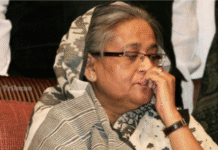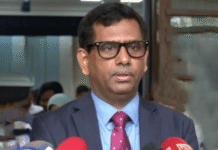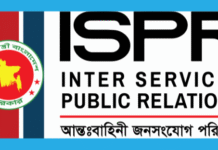The prevailing political vacuum
 Sheikh Hasina’s government has completed a decade at the helm. And Hasina herself has almost completed four decades in politics. She is the central figure in the country’s politics, indeed, the most powerful. Her main rival, BNP chairperson Begum Khaleda Zia, is behind bars, and will be released at Hasina’s behest. BNP’s other leaders too will only be freed from their cases and imprisonment if Hasina’s government wants it so.
Sheikh Hasina’s government has completed a decade at the helm. And Hasina herself has almost completed four decades in politics. She is the central figure in the country’s politics, indeed, the most powerful. Her main rival, BNP chairperson Begum Khaleda Zia, is behind bars, and will be released at Hasina’s behest. BNP’s other leaders too will only be freed from their cases and imprisonment if Hasina’s government wants it so.
BNP’s dreams of toppling the government through an all-out movement and struggle are now a far cry. Conservative Islamic politics has lost its edge, too. The bottom line is Hasina has no viable opposition at the moment.
In the sixties when socialist politics spread throughout the ‘third world’ and even in Europe, it appeared in this country too and under the leadership of Bangabandhu, Awami League shifted from the right to the left. It became part of the left stream that swept through the country’s political, cultural and social arena. And its role became all the more consolidated in the context of world politics through the 1971 liberation war.
In 1981 when Sheikh Hasina became the president of Awami League as a symbol of unity within the party, the country’s politics was still caught up in the sixties’ trend. The Communist Party of Bangladesh (CPB) and other left parties saw her and her party as allies. Even after the fall of the Soviet Union, the fall of the Berlin Wall and the fall of socialism in East Europe, she continued in her support for the old progressive spirit of various movements, such as the Ghatak Dalal Nirmul movement against anti-liberation elements and so on. But the defeat in the 1991 election did not just deal a shocking blow to Sheikh Hasina, but possibly forced the party to undergo a re-evaluation of it is politics.
It was clear that anti-Awami League Muslim nationalist votes made all the difference. The leftist appeal of the sixties had diminished. The awareness of Muslim identity which had arisen in 1946-47 among the Bengali Muslims leading to the establishment of Pakistan, did not give rise to any solid political ideology. And so it was not difficult for a non-communal nationalist spirit to flourish when it came to language and then culture, politics and economy.
However, around 1991, a greater section of the society leaned towards politics of the Islamic ilk and Muslim identity. And ever since independence, whether out of social need or conscious political deliberation, many religious institutions and madrasas sprouted up all over the country. Jamaat and many of their affiliated bodies managed to use these institutions to spread their political ideology and programmes. Such social influence gradually grew.
Alongside the fall of the Soviet Union and weakening of socialism, and the onset of aggressive capitalism through globalisation and the free market, coupled with the rise of religious nationalist conservatism in the US, Europe, India and other important countries, religion-based politics and culture raised its head in this country too. Thus after 1991, our democracy saw secularism and non-communal liberal ideology being replaced with religious ideology and conservative culture.
Actually Awami League underwent a change too at the time. Sheikh Hasina introduced religious thought and culture into the politics of this non-communal party. She opted for pragmatic strategy to meet the need of the moment. But that only served to usher many opportunists into the party.
There was a time when many quarters tried to prove Bangladesh to be a failed state. They were not successful. On the contrary, Bangladesh has made strides in development, also indicating a change in the country’s old trend of politics.
The question is, does Sheikh Hasina grasp the political needs of the day? Or is she just focussing on strategies, moves and tactics to stay in power? Left and centrist politics have dwindled during this decade of her rule. The right and conservative trends have been absorbed and thus neutralised.
And a vacuum has emerged in political leadership. During her rule, even social leaders have lost their clout. It is not to say that she is responsible, but that simply is how things stand.
And on this empty stage, she stands at the sole symbol of hope for Bangladesh. She stands alone and independent, free of any obligations to take advice or decisions from others. A government system that depends on a unitary leader, no matter if it is through an election, is bound to see a degeneration of democratic values and politics. This leads to diminishing pluralistic propensity in the society and stunted social growth.
Democracy must be given due importance for the sake of the people and the country. And stress must be placed on politics for the sake of democracy. But who will take up such politics needed for present times? Sheikh Hasina? Or anyone else?
The politically deprived youth of the country in recent times have given expression to their dissatisfaction with the current system. They have voiced their appeal and shown their ability for change. They are unhappy with the manner in which the government is run and they have even spoken out about how things should be. They have taken to the streets time and again, whenever the opportunity has arisen.
It is possible to disarm a disorganised force by persuasion or force. But is is also becoming evident that Awami League and Chhatra League are no longer effective in diffusing such spontaneous uprisings. Sheikh Hasina, as prime minister, may be successful in this regard, but not though any political process of dialogue or discussion.
The days of manipulating people politically by showing them dreams as in the past, are over. The people now see ways and means of improving their lives and living in front of them. The people are no longer going to give their lives for politics. Their politics will be for building a better life, for enriching life. Pragmatic polices will take priority over empty ideological rhetoric. Leaders will be evaluated in realistic terms, not on the basis of their power, influence, image or ideology.
This has been made obvious in two realistic instances. It was possible for the DUCSU VP to be elected by the common students without any political backing. And from several consecutive elections it is clear that the ruling party and its affiliates have lost the ability to accept the democratic element of defeat. Yet Awami League, when out of power, survived all sorts of conspiracies and oppression and grew strong on people’s power. In order to discern and determine fresh politics to meet the demands of the day, all of this must be taken into cognizance.
* Abdul Momen is columnist, journalist and a poet. This piece appeared in the print edition of Prothom Alo and has been rewritten in English by Ayesha Kabir









